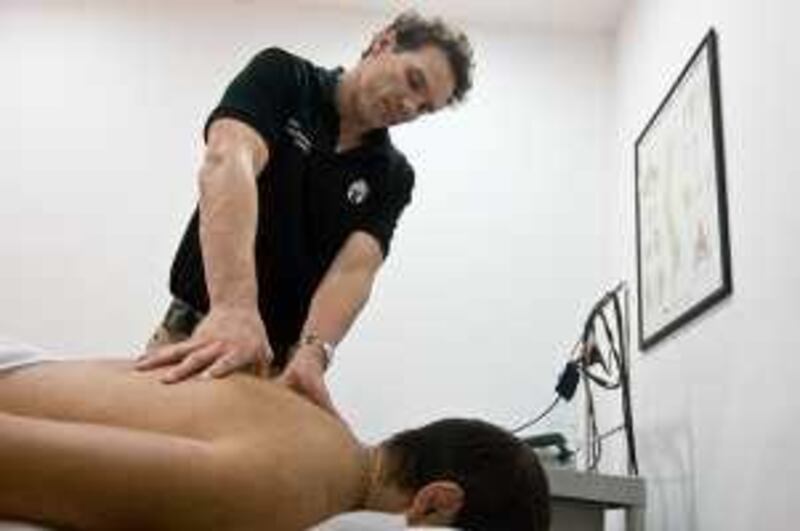Hi-tech living and working in the hot summers of the UAE can literally be a pain in the neck - not to mention the shoulders, back and wrists. Physiotherapists blame demanding office hours, prolonged time spent sitting in traffic and the region's extreme heat for exacerbating body pains and dysfunctions, especially at this time of year.
Tim Fletcher, a musculoskeletal physiotherapist at the Dubai Physio Clinic, said that most of his patients were business people who spent too much time at their desks or behind the wheel of a car. His average patient might be in the office for 12 or 14 hours a day and spend "at least 75 per cent of that time slumped at the desk". Such inactivity could lead to muscle and joint stiffness, poor posture, muscle asymmetry and aches or pains in the shoulders, neck and back.
"We're seeing a lot of clients who are either sitting at their desk, or if they're not, then they're sitting in the car driving home," Mr Fletcher said. "Then when they're home they don't want to do anything but sit again. "So it's from sitting, to sitting, to sitting most of the day." Commuters who wake up as early as 5.30am to drive between emirates are often too tired even to exercise at the gym by the time the work day ended, he said.
Furthermore, the scorching summers discourage people from taking breaks that would entail leaving air-conditioned rooms. "It's hard for people around this time to go and say, 'OK, I'll go and sit outdoors or go for a walk,'" Mr Fletcher said. "So people take their lunch at their desk or somewhere inside the office." Pauline Toland, 36, is typical of the people Mr Fletcher describes. An account manager for a branding company in Dubai, she regularly spends more than 10 hours a day in front of a computer terminal.
"I was hunched over my desk, hunched over the mouse, I wasn't taking regular breaks," she said. "Everyone sits for as long as they possibly can. Even with walking to the bathroom, it was like everybody puts that off to the last moment." Ms Toland, who spends an hour commuting between home and work each day, was no longer exercising as regularly as before she left Ireland in 2007. "I found I wasn't walking anywhere here. I can't walk home, I can't walk to the mall. The minute you get out of work, you're going from a sitting position at work to sitting in a taxi or your car."
In April, she began experiencing excruciating back, neck and shoulder pain that would last for hours, and was forced to seek medical help. She was told to correct her sitting posture so her shoulders and neck were no longer lurching forward. Ms Toland tucked a lumbar roll between her lower back and the back of the chair. She also started swimming at home. She took regular work breaks and "rolled" her shoulders every hour. The pains receded within two months.
Therese Stjernberg, a physiotherapist at the Physio Centre in Dubai Healthcare City, said human bodies were simply not built for so much sitting. "Our bodies are made for going out and hunting in the woods," she said. "We need activity." She stressed that pains and disorders of this sort were common in many other countries. Both Ms Stjernberg and Mr Fletcher agreed that larger companies in the UAE needed to pay more attention to workplace ergonomics. "I know in Sweden, for example, a lot of big companies have an ergonomic physiotherapist who specialises in helping people adjust their seating and which table would be best for them," Ms Stjernberg said.
A 2008 study polling more than 1,000 office workers in the Middle East suggested that Dh2 billion worth of working hours could be lost globally each year due to poor sitting posture. The same study by the Dauphin ergonomics design company found that 68 per cent of staff suffered from some degree of so-called repetitive strain injury, or RSI, a general term for various painful conditions associated with overuse of a tool such as a computer keyboard or mouse.
Ms Stjernberg advised office workers to get lumbar rolls for their chairs or create their own by rolling up a small towel and taping it to the seat. "If you have a fax machine or a printer you use a lot, keep it farther away so you can't just roll your chair over, but you have to get up. Or stand up when you're talking on the phone." Forearms should also rest on the desk and the chair should be at an angle of about 110 degrees, with the top of the computer monitor at eye level.
The employee's stomach should be near the edge of the desk. "These are small things you can do," she said. "It's good to think ahead before the problem develops so you can avoid pain and bad posture." mkwong@thenational.ae





